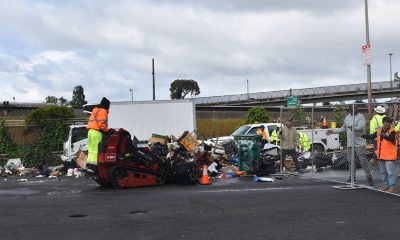Featured
Oak Street Tuff Shed Site Opens, As City Clears Webster Street Unhoused Community

The City of Oakland on Wednesday evicted a group of seven unhoused people who lived along Webster Street and in between 5th and 6th streets, then offered them temporary living space through the city’s tuff shed program, or “Community Cabins,” that recently opened nearby at 598 Oak Street.
“They told us we have five days to vacate the premises,” said Saint, a 55-year-old lifelong Oakland resident who is unhoused and lived at Webster Street.
“It’s stressful to come and tell us we have five days. We’ve been here three years,” said Saint.
When the Oakland Post interviewed Saint three days before the eviction, he said he did not think there would be space for him to move into a tuff shed and was concerned where he would go.
“Whatever way the wind blows, that’s which way I’m gonna go,” he said. “I gotta move my stuff somewhere or they’re going to throw it away.”
On the day of the eviction, other residents reported Saint had moved into a tuff shed, and representatives from the City of Oakland confirmed that there was enough space for all seven people who had been forced to move. This would be Saint’s second time living in a tuff shed as he was asked to leave a previous tuff shed site when he had finished the six-month program last year.
Unhoused residents report that other cabin community sites have offered breakfast and dinner, weekly showers, and space in a 10X12 foot living structure. Two residents live in each structure. The City of Oakland claims the sites also help residents with housing navigation. But some unhoused residents have been critical of those services and say the navigators are unhelpful and undertrained.
“The navigators didn’t really pay attention to us,” said Mouangjoi Tracylee Saelee who lived in a Tuff Shed at 1449 Miller Ave. after being evicted from 12th Street and 23rd Ave, where she had lived in an unhoused community called Housing and Dignity Village in December 2018.
“You cannot take someone off the street or somebody out of prison, hand them a book, and expect them to know everything. You have to go to school for this,” said Saelee.
In a report from October 2018 laying out plans for the 598 Oak St., Assistant City Administrator Joe DeVries wrote, “This site would allow the city to offer shelter to several smaller encampments in the Jack London Square and Chinatown areas…where encampments have impacted youth programming.”
This area is where Webster street is located.
Unhoused people and advocates are noting that the city clears unhoused communities soon after city-run programs to temporarily shelter homeless are opened. Housing and Dignity Village was evicted not long after the nearby Miller Avenue tuff shed site opened, and city representatives encouraged the village’s members to move into that site.
The city also cleared some unhoused communities along Lake Merritt in mid-February 2019, shortly after a Lake Merritt tuff shed site was opened. When the city opened a safe parking site near the Coliseum BART station in the summer of 2019 that serves around 30 vehicles, they also enforced a no-parking zone around 85th and Edes avenues, a location where people had used to live in their vehicles.
The city also tagged over 10 vehicles for towing and eviction at that location.
During the eviction at Webster and 5th streets on Feb. 5, at least one resident chose not to move into a tuff shed but instead to move to another nearby street that an Oakland Police officer said would be evicted in a week.
Another resident said he’d move into the tuff shed since it was his best option but was upset and cursing.
“It’s not even big enough for two people,” he said, choosing not to share his name.
A resident named Anthony, who said he had lived near Webster and 5th streets for six years, was set to move into the tuff shed with his partner and seemed more at peace with the option.
“It’s a better place than this I believe,” he said.
Activism
OP-ED: AB 1349 Puts Corporate Power Over Community
Since Ticketmaster and Live Nation merged in 2010, ticket prices have jumped more than 150 percent. Activities that once fit a family’s budget now take significant disposable income that most working families simply don’t have. The problem is compounded by a system that has tilted access toward the wealthy and white-collar workers. If you have a fancy credit card, you get “presale access,” and if you work in an office instead of a warehouse, you might be able to wait in an online queue to buy a ticket. Access now means privilege.

By Bishop Joseph Simmons, Senior Pastor, Greater St. Paul Baptist Church, Oakland
As a pastor, I believe in the power that a sense of community can have on improving people’s lives. Live events are one of the few places where people from different backgrounds and ages can share the same space and experience – where construction workers sit next to lawyers at a concert, and teenagers enjoy a basketball game with their grandparents. Yet, over the past decade, I’ve witnessed these experiences – the concerts, games, and cultural events where we gather – become increasingly unaffordable, and it is a shame.
These moments of connection matter as they form part of the fabric that holds communities together. But that fabric is fraying because of Ticketmaster/Live Nation’s unchecked control over access to live events. Unfortunately, AB 1349 would only further entrench their corporate power over our spaces.
Since Ticketmaster and Live Nation merged in 2010, ticket prices have jumped more than 150 percent. Activities that once fit a family’s budget now take significant disposable income that most working families simply don’t have. The problem is compounded by a system that has tilted access toward the wealthy and white-collar workers. If you have a fancy credit card, you get “presale access,” and if you work in an office instead of a warehouse, you might be able to wait in an online queue to buy a ticket. Access now means privilege.
Power over live events is concentrated in a single corporate entity, and this regime operates without transparency or accountability – much like a dictator. Ticketmaster controls 80 percent of first-sale tickets and nearly a third of resale tickets, but they still want more. More power, more control for Ticketmaster means higher prices and less access for consumers. It’s the agenda they are pushing nationally, with the help of former Trump political operatives, who are quietly trying to undo the antitrust lawsuit launched against Ticketmaster/Live Nation under President Biden’s DOJ.
That’s why I’m deeply concerned about AB 1349 in its current form. Rather than reining in Ticketmaster’s power, the bill risks strengthening it, aligning with Trump. AB 1349 gives Ticketmaster the ability to control a consumer’s ticket forever by granting Ticketmaster’s regime new powers in state law to prevent consumers from reselling or giving away their tickets. It also creates new pathways for Ticketmaster to discriminate and retaliate against consumers who choose to shop around for the best service and fees on resale platforms that aren’t yet controlled by Ticketmaster. These provisions are anti-consumer and anti-democratic.
California has an opportunity to stand with consumers, to demand transparency, and to restore genuine competition in this industry. But that requires legislation developed with input from the community and faith leaders, not proposals backed by the very company causing the harm.
Will our laws reflect fairness, inclusion, and accountability? Or will we let corporate interests tighten their grip on spaces that should belong to everyone? I, for one, support the former and encourage the California Legislature to reject AB 1349 outright or amend it to remove any provisions that expand Ticketmaster’s control. I also urge community members to contact their representatives and advocate for accessible, inclusive live events for all Californians. Let’s work together to ensure these gathering spaces remain open and welcoming to everyone, regardless of income or background.
Activism
Oakland Post: Week of December 31, 2025 – January 6, 2026
The printed Weekly Edition of the Oakland Post: Week of – December 31, 2025 – January 6, 2026

To enlarge your view of this issue, use the slider, magnifying glass icon or full page icon in the lower right corner of the browser window.
Activism
Big God Ministry Gives Away Toys in Marin City
Pastor Hall also gave a message of encouragement to the crowd, thanking Jesus for the “best year of their lives.” He asked each of the children what they wanted to be when they grow up.

By Godfrey Lee
Big God Ministries, pastored by David Hall, gave toys to the children in Marin City on Monday, Dec. 15, on the lawn near the corner of Drake Avenue and Donahue Street.
Pastor Hall also gave a message of encouragement to the crowd, thanking Jesus for the “best year of their lives.” He asked each of the children what they wanted to be when they grew up.
Around 75 parents and children were there to receive the presents, which consisted mainly of Gideon Bibles, Cat in the Hat pillows, Barbie dolls, Tonka trucks, and Lego building sets.
A half dozen volunteers from the Big God Ministry, including Donnie Roary, helped to set up the tables for the toy giveaway. The worship music was sung by Ruby Friedman, Keri Carpenter, and Jake Monaghan, who also played the accordion.
Big God Ministries meets on Sundays at 10 a.m. at the Mill Valley Community Center, 180 Camino Alto, Mill Valley, CA Their phone number is (415) 797-2567.
-

 Activism3 weeks ago
Activism3 weeks agoDesmond Gumbs — Visionary Founder, Mentor, and Builder of Opportunity
-

 Advice4 weeks ago
Advice4 weeks agoSupport Your Child’s Mental Health: Medi-Cal Covers Therapy, Medication, and More
-

 Activism3 weeks ago
Activism3 weeks agoFamilies Across the U.S. Are Facing an ‘Affordability Crisis,’ Says United Way Bay Area
-

 Alameda County3 weeks ago
Alameda County3 weeks agoOakland Council Expands Citywide Security Cameras Despite Major Opposition
-

 Alameda County3 weeks ago
Alameda County3 weeks agoBling It On: Holiday Lights Brighten Dark Nights All Around the Bay
-

 Activism3 weeks ago
Activism3 weeks agoBlack Arts Movement Business District Named New Cultural District in California
-

 Activism3 weeks ago
Activism3 weeks agoLu Lu’s House is Not Just Toying Around with the Community
-

 Activism3 weeks ago
Activism3 weeks agoOakland Post: Week of December 17 – 23, 2025























































